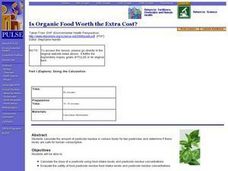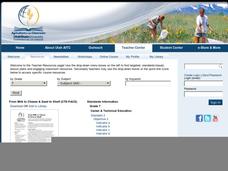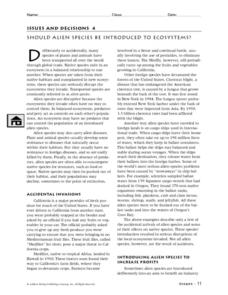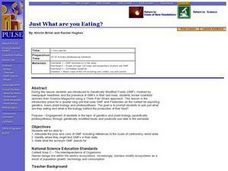EngageNY
Close Reading and Gathering Evidence from Frightful’s Mountain and “Welcome Back”
Where did the falcons go? Scholars read the article Welcome Back which describes the disappearance of falcons due to the use of pesticides. During a second read, learners annotate the text by marking unfamiliar words and facts about...
Curated OER
Operation Mexfly
Students research information about pesticides. Students discuss the history of the Mexican fruit fly. They experiment to discover malathion concentration levels in organisms. Students explore the effect of toxins at the top of the...
Curated OER
Industrial Agriculture
Students write about the benefits that industrial agriculture has had on growing crops. In this industrial agriculture lesson plan, students research how technology has impacted the processing speed of growing food.
Curated OER
Habitat survival
Sixth graders study different environments and how the food chain affects the survival of different animals. In this environments lesson plan, 6th graders share the visuals which describe the characteristics of the environment that they...
Curated OER
Is Organic Food Worth the Extra Cost?
Young scholars calculate the amount of pesticide residue in selected foods for two
pesticides and determine if these levels are safe. They read an article about a
research study looking for metabolites of these pesticides in children....
Curated OER
Genetically Modified Foods
Students explain what genetically modified foods are and how they are created. Students use appropriate vocabulary to describe and effectively discuss the benefits of, and potential risks of, genetically modified foods.
Cornell University
Beneficial Insects
A lot of people think of insects as pests. But actually, some insects are beneficial because they get rid of pests! After learning about beneficial insects, class members research given insects to find out if they are pests or predators.
Curated OER
Organic Feud
Young scholars examine possible pesticide exposure in their fruit and vegetable consumption. They compile fact sheets exploring various organic food issues and interview their parents about the food choices they make for their Students.
Curated OER
From Milk to Cheese & Seed to Shelf
Learn about food production by making cheese, seeing how a seed gets to a shelf, and discussing food safety. Budding agriculturalists complete several activities and learn about food production, biotechnology, food preservation,...
Curated OER
Paying With Their Health
Students consider the plight of immigrant workers. In this undocumented immigrant lesson plan, students compare the worker of the Industrialization era to the undocumented immigrant workers of today. Students read and discuss literature...
Curated OER
Issues And Decisions 4
In this environment activity, students read a passage on why alien species should be introduced to ecosystems. Then they respond to four questions that refer to the passage read. Students also respond to two decision questions by giving...
Curated OER
Peregrine Falcon
Young environmentalists study the effects that pesticides have on birds, such as the peregrine falcon. They also look at predator/prey interactions. Some wonderful in-class activities accompany an inventive lesson. After an activity that...
California Academy of Science
Pollution in Our Watershed
The concept of a how pesticides and other chemicals pass through a watershed can be difficult for younger learners to grasp without a concrete example. In the activity here, some blank paper, markers, and a spray bottle are all you need...
Curated OER
Weeds on the Windowsill
Students study farming and reasons to control weeds. They examine pesticides necessary for the control of weeds and the damage to the environment. Through experimentation, students plant seeds in different soils and determine if seeds...
Curated OER
Chemicals in Your Life
In this chemicals activity, students fill in 61 blanks of statements comparing the chemicals used in farming and the chemicals found in medicines and food.
Curated OER
Just What are you Eating?
Learners identify and articulate pros and cons of genetically modified foods (GMF) including references to scale of controversy worldwide. Students then identify where they might find GMFs in their diets, read different opinion pieces on...
Curated OER
Buggy Diner
Students observe different insects and the different kinds of foods they like to eat. In this insects lesson plan, the teacher collects insects and different plants and roots. Then the students learn about those insects and have to be...
Curated OER
Restaurants and Institutional Examination 4
Match the vocabulary terms in column A with the definitions in column B. Write the letter of the definition in column B in the space next to the terms in column A.Write short answers or fill in the blank to the following questions and...
Curated OER
The Trail of a Snack Food
Students identify some of their favorite snack foods. Using this information, they discover the resources needed to produce the food. In groups, they research different alternatives to make their favorite food in order to protect the...
Curated OER
Pyramid of Biomass
Learners interpret data to demonstrate biomass and number pyramids. They use information to draw conclusions and examine an example of biological magnification.
Curated OER
Fertilizers, Pesticides and Health
Pupils apply real data to create and calculate algebraic equations. Students create a visual to represent the concentration for one part per million and apply unit analysis to verify measurement computations. Pupils define the use of a...
National Wildlife Federation
Habitat Web
Young scientists weave together an understanding of ecosystems with this fun collaborative activity. Taking on the roles of different living and non-living elements of specific habitats, learners use a ball of yarn to create the web of...
Curated OER
What's Organic?
Young scholars discuss background information presented by the teacher and read dictionary definitions for the words "organic" and "synthetic." In this gardengin lesson, students complete a worksheet on the material. Young scholars grow...
Curated OER
Isolation of Synthetic Chemicals from Plant Leaves
Students isolate and identify a dye, which represents a synthetic pesticide, from plants.

























